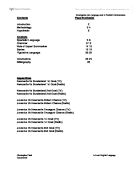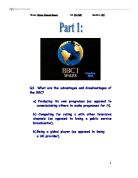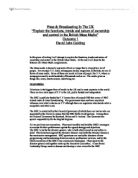History of the BBC.
History of the BBC The British Broadcasting Company was set up by a group of executives from radio manufacturers in December 1922. John Reith became general manager of the organization. In 1927 the government decided to establish the British Broadcasting Corporation (BBC) as a broadcasting monopoly operated by a board of governors and director general. The BBC was funded by a licence fee at a rate set by parliament. The fee was paid by all owners of radio sets. The BBC therefore became the world's first public-service broadcasting organization. Unlike in the United States, advertising on radio was banned. John Reith was appointed director-general of the BBC. Reith had a mission to educate and improve the audience and under his leadership the BBC developed a reputation for serious programmes. Reith also insisted that all radio announcers wore dinner jackets while they were on the air. In the 1930s the BBC began to introduce more sport and light entertainment on the radio. The BBC began the world's first regular television service in 1936. This service was halted during the Second World War and all BBC's efforts were concentrated on radio broadcasting. In 1940 John Reith was appointed as Minister of Information Writers such as J. B. Priestley, George Orwell, T. S. Eliot, William Empson, and Charlotte Haldane were recruited by the BBC and radio was used for internal and
For this piece of coursework I have decided to make an investigation into language used in football commentaries.
Contents Page Number(s) Introduction 2 Methodology 3 4 Hypothesis 5 Analysis Specialist Language 6 8 Grammar 9 13 Role of Expert Summariser 4 15 Syntax 6 19 Figurative Language 20 22 Conclusions 23 24 Bibliography 25 Appendices Newcastle Vs Sunderland 1st Goal (TV) Newcastle Vs Sunderland 1st Goal (Radio) Newcastle Vs Sunderland 2nd Goal (TV) Newcastle Vs Sunderland 2nd Goal (Radio) Juventus Vs Newcastle Robert Chance (TV) Juventus Vs Newcastle Robert Chance (Radio) Juventus Vs Newcastle Trezeguet Chance (TV) Juventus Vs Newcastle Trezeguet Chance (Radio) Juventus Vs Newcastle 1st Goal (TV) Juventus Vs Newcastle 1st Goal (Radio) Juventus Vs Newcastle 2nd Goal (TV) Juventus Vs Newcastle 2nd Goal (Radio) Introduction * For this piece of coursework I have decided to make an investigation into language used in football commentaries. I have always had a keen interest in football, both as a player and spectator. Recently, though, I have begun to notice that the two main methods of media presentation, television and radio broadcasting differ quite substantially. Therefore, the focus of my coursework will be to examine the common linguistic features found in both radio and television presentations of football matches and how they differ. I think this is an interesting focus for my coursework and it will be interesting to look at how important
Brief History of TV.
Brief History of TV Curious about the history of television? Welcome to: "Television History - The First 75 Years" The entire website is devoted to the history of the design, development, and marketing of the television set. It is arranged in a chronological order, year-by-year, so you can see how things progressed. The timeline button bars on the Home Page will take you to hundreds of illustrations, graphics, reference articles, advertising, photos and scans of real TV sets of long ago, from the US, Europe and Japan. When clicking hot-links on this page, it is better & faster to use your browser's "BACK" button to return to this page. Television Development - 100 Years at a glance 880s to 1899 Period of Dreams, Concepts and Initial Discoveries 900 The word "Television" is first used 922 to 1927 Early Experiments with a MECHANICAL scanning disc system. TV Picture is neon orange and very small. 928 to 1934 First Mechanical TV Sets sold to public -- At the peak, 42 US stations were in operation using the Jenkins system. However, picture quality is lacking. Not suitable for commercial use. Electronic TV offers greater promise. 926 to 1935 Early Experiments with All-Electronic Cathode Ray Television (the basic system we have today) 935 to 1941 Electronic (Experimental) TV begins broadcasting in Germany, England, Italy, France, USA, Holland, etc. Early 1940s
Taking the BBC and at least one other foreign public broadcaster as your focus, discuss the challenges faced by public service broadcasters in the global multi-channel market.
Taking the BBC and at least one other foreign public broadcaster as your focus, discuss the challenges faced by public service broadcasters in the global multi-channel market. Introduction Radio Telefis Eireann (RTE) is the national public service broadcasting organisation in Ireland with a remit overseeing and operating two television stations, three radio stations, a concert orchestra, a symphony orchestra, and also publishing Irelands best-selling magazine `The RTE Guide`. There are some two thousand people employed by RTE, most of which are based at the Montrose-Donnybrooke site in Dublin. Historically, broadcasting in Ireland developed through the civil service structures and is therefore seen by some commentators to have evolved towards a certain bureaucratic style of administration. While for a time the only indigenous broadcasting organisation within the state, RTE has always had to compete with the UK and other broadcasting output. More recently, the further development of independent radio and television has led to a slow down in RTE's advertising revenue, occurring at a time when revenue from the license fee was stabilising (1996-97). Section 1 * Aims and outlines At the beginning of the twenty-first century, terrestrial broadcasters, in particular those who operate as public service broadcasters, find themselves having to exist within an ever increasing
What are the advantages and disadvantages of the BBC?
Q1. What are the advantages and disadvantages of the BBC? a) Producing its own programes (as opposed to commissioning others to make programes for it). b) Competing for rating s with other television channels (as opposed to being a public service broadcaster). b) Being a global player (as opposed to being a UK provider). Traditionally public service broadcasting has conjured up a set of ideological and often political stereotypes, born in the main from an overall demeanour of middle class, institutionalized beliefs and practices. Post 1946, when television broadcasting resumed, the BBC's popularity was at its height, largely because of its part in the nations efforts during the Second World War, and there exists today, even for those born many years after the war, a resonance passed down through folk-memories, i.e. Winston Churchill's instantly recognizable speeches, broadcast by the BBC. Now, in the 21st century, BBC is having to redefine itself to both the public and politicians. ITV's too shares many of the current crisis' in broadcasting, predictably issues surrounding funding/revenue and it is also having to reassess its position in terms of self perception and audience perception. Now, I will I will explain the advantages and disadvantages for these choices, First if BBC should be a maker of programmes or a commissioner of programmers? Second, if it have to
radio station analysis
Research - Analysis of Radio Stations and Shows In this assignment I will look at a range of radio stations and programmes looking at various logistics making them what they are. I will initially look at a range of radio stations and analyse them, breaking them down into target audience, age range of audience, demographics and the social status of the listeners. I will choose two stations from the BBC and one commercial station. I have chosen to analyse only one commercial station as two commercial stations within the same region will be fairly similar in style and speech content et cetera. I have chosen Trent FM due to it being Nottingham's oldest commercial station whereas other commercial stations in Nottingham such as Heart FM are owned by corporate companies running other stations around the country such as Capital Radio and FXM. I will also choose three radio programmes, one from a local BBC station, one from a nationwide BBC station and a radio show from a pirate station. I will look at presentation of the show, speech content of the presenters, target audience and the overall style. For the analysis of radio stations I have chosen BBC Radio One and Four. This way I will have looked at each end of the scale-Radio One being quite upbeat and geared towards a younger audience and Radio Four being partly political and partly artistic-but not in a modern arts way.
The formation and development of BBC radio
Question 1 The formation and development of BBC radio Text Box: The BBC was established as a private corporation in October 1922, funded through a broadcast receiving licence fee plus ten per cent of the revenue generated from the sale of radio receivers. The service was an immediate success, with over a million licences sold by the Post Office before regular daily transmissions began. Within three years around 85 per cent of the population was able to receive the broadcasts, which consisted of a variety of entertainment for all ages as prescribed in the broadcasting licence. News broadcasts were banned by the government until after 7pm because of pressure from the powerful Newspaper Proprietors Association, whose members viewed the new medium as a threat to their circulation. In addition, regulation required that all news bulletins were to be purchased from selected news agencies. With the granting of the royal Charter the restrictions were relaxed slightly and the BBC was allowed to broadcast a limited news service during the day. a) Producing its own programs: The advantages: When BBC producing its own programs by depending on it self it will categorize as a creative organization and the programs and will gain more power full in the media. This will help BBC to demand more on its internal environment or it interval community. Any program in
The radio.
Radio James Clerk Maxwell had a prediction. By working "out the laws concerning electromagnetism in 1865, [he] had predicted that an oscillating current would produce radiation with an extremely long wavelength." (1) In other words, he had proved mathematically that certain electric currents could be detected at great distances. After that, people like Guglielmo Marconi and Reginald Aubrey Fessenden began working on a new invention; the radio. But the radio was not just invented by one man, or at one time. It took a period of about a century (1864-1960) before the first radios were perfected and sold to the general public. When they were first put on the market radios started selling like hotcakes, and, because of this, they ended up changing a nation. Radios are very complex machines, but without them America would still be in a time of confinement and darkness. Michael Faraday showed that an electrical current could produce a magnetic field. This find lead to Nikola Tesla, 1893, inventing a way of sending messages via wireless telegraph. He perfected this idea, and by 1897 he transmitted a message over 25 miles. Heinrich Hertz discovered Hertzian waves using an oscillator and a spark gap. Next came Oliver Lodge, who invented the coherer by looking at Edouard Branly's discovery that metal powders cohered to one another and putting them to practice. Lodge only used the
Explain the functions, trends and nature of ownership and control in the British Mass Media
Press & Broadcasting In The UK "Explain the functions, trends and nature of ownership and control in the British Mass Media" Outcome 1 David John Golding In this piece of writing I will attempt to explain the functions, trends and nature of ownership and control in the British Mass Media. At the end I will describe the features of a Mass Media conglomerate. The Mass media is basically any style of text or image that is viewed by a lot of people. For example T.V, radio, newspapers, books, magazines, billboards, etc are all forms of mass media. Some of these can reach millions of people like T.V, where as newspapers usually reach hundreds of thousands and so on. The media gives us things like, news, entertainment, advertising etc. TELEVISION: Television is the biggest form of media in the UK and in most countries in the world. There are two main types of T.V in the UK, public funded and independent. The BBC is publicly funded by T.V licence fees of around £100 that cover all BBC related audio & visual broadcasting. The government does not have any direct influence over what is shown on T.V although there are regulators who decide what is acceptable and what is not. The BBC is controlled by their board of governors of which there are twelve who are appointed by the Crown to ensure that the BBC fulfils its obligations. Among them are National Governors for
What is local radio better at than National Radio?
Evaluating Radio stations * What is local radio better at than National Radio? Local and national radio both broadcast news but they both differ due to the fact that they have and use different techniques. First of all, national radio broadcast news from around the country and local just broadcasts local area news. National radio news is an individual's work; it isn't just copied from any journalist. The news is much more detailed and has less of gossip. It's much more serious and formal. Whereas, Local radio news is abbreviated much shorter and simple. The news maybe copied from a journalist. It won't be as detailed as a national radio will make it, even if it's the same story! Local radio news is said in informal ways, the presenters will tell the listeners their opinions on the stories, whereas the national radio news presenters will just read the story. When it comes to music then I believe that they won't be much of a difference because the local radio will play music by Kylie Minogue just the way national radio will. So to be honest I don't think that they will be much of a difference. What can be said is that in different local radios, they tend to play music associated to their name. For example: Classic FM: this radio station will only play classical music, so one can not expect them to play rock or pop. National radios will advertise nights out in big cities












